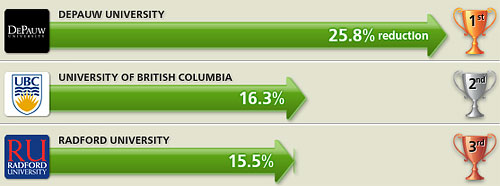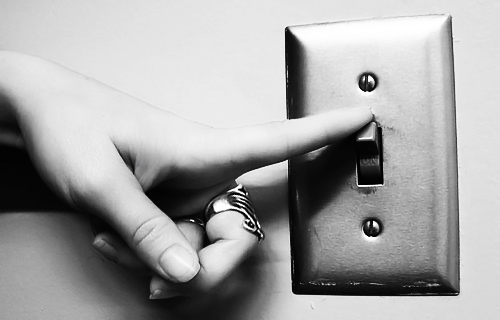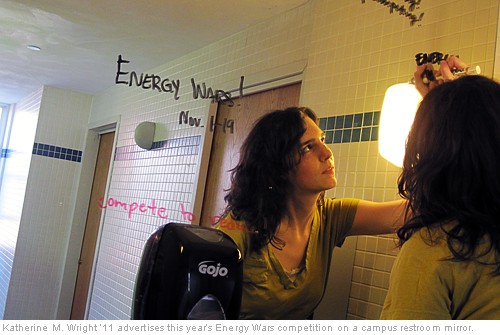The Big Turn Off
November 16, 2010
11/23 Update — With a 25.8 percent reduction in electricity use, DePauw University was the top campus reducer during Campus Conservation Nationals (CCN) 2010. DePauw was among nearly 40 campuses that collectively reduced their electricity consumption by 508,694 kilowatt-hours over a three-week period, saving $50,209 and averting 816,394 pounds of carbon dioxide from the atmosphere.

For the victory, the University will receive Lucid Design Group's Building Dashboard® software, which enables students to view, compare and share building resource use data, track electricity budgets, host real-time competitions and communicate sustainability efforts to the campus community.
"Over the past three weeks, students showed that curtailing electricity and water use is achievable in dorms and residence halls simply by changing their behavior," said Andrew de Coriolis, Public Programs Manager at Lucid Design Group. "And the savings are impressive – the equivalent of 402,242 miles in a 29-mpg car."
In an interview with CCN 2010's organizers, Assistant Director for Sustainability Missy Orr said that grassroots interest among DePauw's students ultimately made the difference in the competition.
"It was really important to have our RAs involved," she said. "Having them challenging their residence halls to take action was really effective for us."
The Energy Wars team congratulates all of DePauw's participants for their conservation. DePauw made history by winning the first national conservation competition, and it's because each hall took the challenge to the extreme!

If students around campus have a bit of an air about them lately, it's because they have done their part during Campus Conservation Nationals (CCN) 2010. By turning off lights, shutting down computers and, yes, even skipping a shower or two, DePauw's residence halls have kept the University among the leaders of the inaugural water and energy savings competition. With CCN 2010's final campus report due on Nov. 19, a strong finish can carry DePauw to victory over the nearly 40 colleges competing nationally.
"DePauw is so close to winning," says Missy Orr, assistant director for sustainability and 2009 DePauw graduate. "We're dancing between first and second place, and we could make history as the first university to win a national conservation competition."
CCN 2010's rankings are updated daily and can be viewed online at www.buildingdashboard.net/depauw. College Street Hall leads the campus in electricity savings, and is in the top 10 nationally. Humbert Hall is the only DePauw residence hall to have reduced its water consumption from a baseline measurement taken in October.
Orr recommends a few strategies to help secure a win. The biggest savings, she says, can be made by cutting out showers, unplugging mini-fridges and by using campus buildings such as the library – public buildings aren't part of the competition – for study sessions.
"With only a couple days left, we need a final push with everyone on board," Orr says.
The winner of CCN 2010 will receive a digital energy metering system, allowing buildings to be monitored online in real-time. That would certainly make life easier for Assistant Director of Facilities Management Jim Ruark, who travels to each residence hall three times a week to collect data for the competition. More importantly, Orr says it would help to change behavior on campus by making energy information readily accessible to all students.
"Winning [CCN] would be transformative for DePauw's campus initiatives and future conservation competitions," Orr says. "We would be connected to our resource consumption like never before. You could look at the online dashboard and see the electricity usage go down just by turning off your lights!"
CCN 2010 is running parallel to DePauw's Energy Wars, a similar competition held each fall and spring by the University's residence halls and Greek houses. During Energy Wars, smaller changes in energy use can also be effective, and can create behaviors that last throughout the year.

"It's easy to get in the habit of turning lights out, unplugging your computer and other appliances when not in use, turning off the water when brushing your teeth, only doing full loads of laundry and avoiding the elevator when you can use the stairs," Orr says. "The great part about Energy Wars is that everyone can contribute on different levels while hopefully challenging themselves and their habits."
Seniors Margaret "Maggie" B. Baber, Anthony M. Baratta and Taylor M. Cantril began Energy Wars as freshmen in 2008. The campus competition has continued every year since, with winners donning the distinctive victory shirts. To date, Mason Hall is the only residence hall to have won twice.
Cantril says that pushing students to consider their energy use isn't unprecedented at DePauw, but that these competitions have been the most exciting way to get students involved.
"I was recently talking to Susan Hagaman ['64], a member of the Board of Visitors, who said when she was a student at DePauw, she was charged 25 cents if she left her room without turning her lights out," Cantril says. "At DePauw today, we don't charge people for how much electricity they use, and we don't fine people even if they are clearly wasting the Earth's resources and the University's operating budget. Instead, we have Energy Wars. I hope it's a fun, interactive alternative."
Back